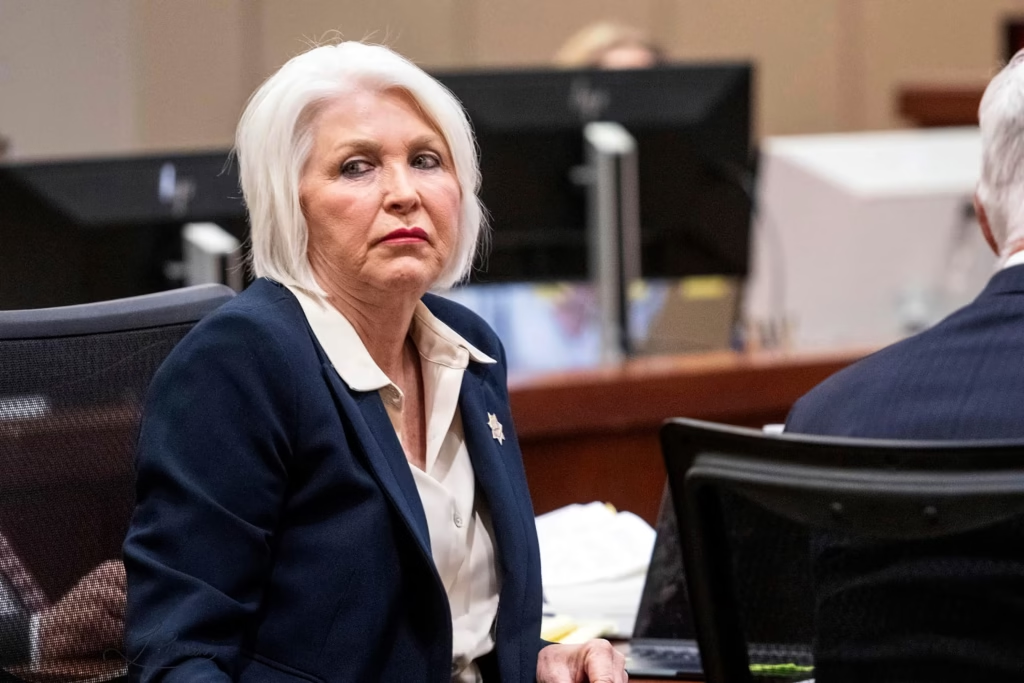Tina Peters release is now at the center of a heated political battle. Former U.S. President Donald Trump has called for her immediate freedom after her conviction in a major election data scheme. Peters, a once little-known county clerk, has now become a national symbol for election deniers, sparking a fierce debate about justice, politics, and democracy in America.
Who is Tina Peters?
Tina Marie Peters was born in 1955 and served as the Clerk and Recorder of Mesa County, Colorado, from 2019 to 2023. In that role, she was responsible for overseeing elections in her county. Her career took a dramatic turn after the 2020 presidential election, when she became an outspoken critic of voting machines and echoed conspiracy theories about widespread voter fraud.
Peters aligned herself with groups that pushed election denial narratives, insisting that the 2020 results could not be trusted. Her actions went far beyond public statements, eventually drawing her into serious legal trouble.
The Election Data Breach
In 2021, Peters allowed unauthorized access to election equipment during a routine software update. A non-employee was given access to secure areas using another person’s credentials. As a result, sensitive data from Dominion Voting Systems hard drives was copied and later shared online.
This breach was viewed as a significant security risk. State officials argued that Peters endangered the integrity of election systems. Her conduct, they said, not only violated election laws but also damaged public trust in the security of voting machines.
The Criminal Charges
In August 2024, a Colorado jury convicted Peters on seven of ten counts brought against her. Four of those charges were felonies, including attempting to influence a public servant, conspiracy to commit criminal impersonation, and official misconduct.
She was also convicted of violating her official duties and failing to follow regulations from the Secretary of State’s office. In October 2024, Peters was sentenced to nine years in prison and ordered to pay fines.
During sentencing, the judge was harsh in his remarks, describing Peters as someone who spread lies and fueled distrust in elections. He accused her of acting recklessly under the guise of patriotism.
Appeals and Legal Battle
Peters’ legal team quickly filed appeals, arguing that her conviction was politically motivated. They sought her release on bond while her case was under review. In addition, her attorneys argued that her First Amendment rights were being suppressed, claiming she was punished for speaking out against election systems.

Her case became a rallying point for those who believed the justice system was being used against political opponents. For election security officials, however, the case stood as an example of how conspiracy-driven actions could undermine democratic processes.
Trump’s Demand for Tina Peters Release
Former President Donald Trump has repeatedly defended Tina Peters. In August 2025, he took to Truth Social, demanding her release in urgent and dramatic terms. Trump described her as a brave patriot and claimed she was being unfairly punished.
In his posts, Trump insisted that Peters was innocent and argued she was targeted because she tried to expose supposed flaws in voting systems. He went further by threatening “harsh measures” if Colorado officials did not free her.
This was not Trump’s first intervention. Earlier in 2025, he instructed the Justice Department to pursue legal action supporting her release. He has framed Peters as a victim of political bias, saying her imprisonment is an attack on those who questioned the 2020 election.
Why the Case Matters
Election Security Concerns
Experts argue that Peters’ breach of voting systems is not a minor violation. By allowing unauthorized access, she exposed election equipment to risk. The data leak also spread across online forums, further fueling conspiracy theories.
Rule of Law
Defending a convicted official accused of breaking security laws raises questions about whether political loyalty is overshadowing the rule of law. Critics of Trump’s actions say calling for Peters’ release undermines faith in courts and legal processes.
Political Polarization
Peters’ case has become a symbol for election denial movements. Her name now carries weight in discussions about voting machine distrust and conspiracy theories. For Trump supporters, she represents courage; for others, she is a reminder of the dangers of undermining elections.
Federal vs. State Authority
Trump’s demands highlight an important constitutional point. Peters’ conviction came under Colorado state law, meaning Trump has no direct power to pardon her. While he can use political pressure, the decision lies with state courts or the governor.
Colorado’s Response

State officials have rejected Trump’s statements. Colorado Secretary of State Jena Griswold called Peters’ actions a direct attack on election security and said her conviction was a necessary step to protect democracy.
The Republican district attorney who prosecuted Peters, Daniel Rubinstein, also defended the verdict. He said the jury decision was based on evidence, not politics. According to him, Peters’ supporters are ignoring the seriousness of her crimes.
So far, no Colorado official has shown willingness to intervene in Peters’ sentence. The state has made clear that Trump’s demands will not override the legal process.
What Happens Next
Peters’ appeal remains active. Her attorneys hope to overturn the conviction or at least reduce her sentence. Legal experts note that appeals can take months or even years, and it is unlikely she will be released soon without a direct ruling from a higher court.
Meanwhile, Trump continues to raise her case in rallies and online posts, making Peters a national figure ahead of the 2026 midterms. For election-denying groups, she is a martyr. For election officials, she is proof of the risks posed by conspiracy theories.
Quick Facts About Tina Peters
- Former Clerk and Recorder of Mesa County, Colorado
- Convicted on seven charges in August 2024, including four felonies
- Sentenced to nine years in prison in October 2024
- Appeal process currently underway
- Trump has called her a patriot and demanded her release
- State officials maintain her conviction was fair and necessary
Conclusion
The debate over Tina Peters release is more than a legal battle. It reflects a larger struggle over how America handles election security, political loyalty, and the rule of law. Peters’ conviction highlights the dangers of allowing conspiracy theories to guide public officials.
Trump’s intervention, meanwhile, shows how political figures can reshape public perception of a criminal case. Whether Peters remains behind bars or wins her appeal, her case will continue to spark controversy in the months ahead.
At the heart of the matter lies a critical question: should election officials who break the law in pursuit of conspiracy theories be treated as patriots or criminals? The answer will influence not just the future of Tina Peters, but also the integrity of American elections.
Do Follow USA Glory On Instagram
Read Next – Eric Adams Adviser Bribery Potato Chip Bag: A Strange Twist in New York Politics






